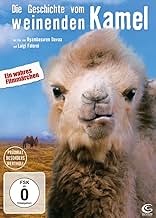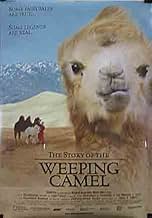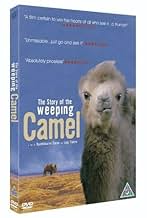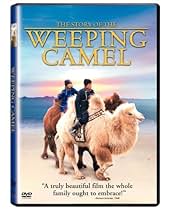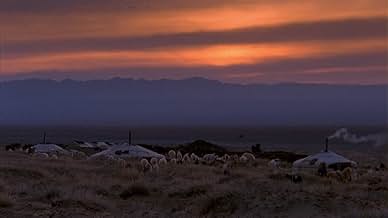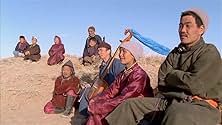IMDb RATING
7.4/10
6.5K
YOUR RATING
When a Mongolian nomadic family's newest camel colt is rejected by its mother, a musician is needed for a ritual to change her mind.When a Mongolian nomadic family's newest camel colt is rejected by its mother, a musician is needed for a ritual to change her mind.When a Mongolian nomadic family's newest camel colt is rejected by its mother, a musician is needed for a ritual to change her mind.
- Directors
- Writers
- Stars
- Nominated for 1 Oscar
- 10 wins & 9 nominations total
- Directors
- Writers
- All cast & crew
- Production, box office & more at IMDbPro
Featured reviews
In the spring of the Gobi Desert, in South Mongolia, a nomadic family of shepherds has troubles when one camel has a tough two days delivery, immediately rejecting the offspring. The family unsuccessfully uses their best efforts trying to force the female to accept and feed the newborn. When there is no further hope of saving the animal, they send their two sons to bring a musician from the nearest town to perform a ritual and save the "baby camel".
I do not know, and I was really curious to know, how could be the original screenplay of this documentary. I believe the first intention of directors Byambasuren Davaa and Luigi Falorni would be to document the lifestyle of a nomadic family of shepherds, showing a different culture for the Westerners. However, fortune gave them the opportunity of sharing a great experience with the viewers with the ritual that brought the camel to accept the offspring. Thank you, Messrs. Byambasuren Davaa and Luigi Falorni, for such touching, beautiful and wonderful film. My vote is nine.
Title (Brazil): "Camelos Também Choram" ("Camels Also Weep")
I do not know, and I was really curious to know, how could be the original screenplay of this documentary. I believe the first intention of directors Byambasuren Davaa and Luigi Falorni would be to document the lifestyle of a nomadic family of shepherds, showing a different culture for the Westerners. However, fortune gave them the opportunity of sharing a great experience with the viewers with the ritual that brought the camel to accept the offspring. Thank you, Messrs. Byambasuren Davaa and Luigi Falorni, for such touching, beautiful and wonderful film. My vote is nine.
Title (Brazil): "Camelos Também Choram" ("Camels Also Weep")
We heard that National Geographic was involved with this film, so expected some first-class photography. We were not disappointed.
The setting is amongst an extended family group, eking out a simple, rural existence on the high desert plains of Mongolia. It is the end of the calving season, and the last camel in the herd remains to give birth. We are privileged to witness the event in an non-intrusive way. It is the mother's first delivery and she encounters difficulties, probably through inexperience, and the human attendants feel compelled to assist. Not easy, with such a large animal, but eventually a healthy while colt is born before our very eyes. One suspect possibly because of the human intervention, the mother rejects the little one, and brushes away its repeated attempts to feed. Before long, the offspring is isolated from the mother and herd. Its mournful wailing sounds permeate the still Mongolian atmosphere with a haunting melancholy which cannot fail to turn the viewer's heart. Repeated attempts are made to reconcile the colt and its mother. As they all fail, the family decides to embark on a traditional ceremony as a last resort. This involves engaging a violinist to play music to the pair - a solution not as easy as it sounds, for the nearest skilled musician is in a remote provincial town which is at least a decent camel ride away. He eventually arrives and the ceremony commences. The outcome is best left for the viewer, suffice to say that here we have a touching film, with the splendor of the Mongolian landscape and the soft gentle colours of its sunsets as a backdrop. Worthy of a rating of 8 out of 10.
The setting is amongst an extended family group, eking out a simple, rural existence on the high desert plains of Mongolia. It is the end of the calving season, and the last camel in the herd remains to give birth. We are privileged to witness the event in an non-intrusive way. It is the mother's first delivery and she encounters difficulties, probably through inexperience, and the human attendants feel compelled to assist. Not easy, with such a large animal, but eventually a healthy while colt is born before our very eyes. One suspect possibly because of the human intervention, the mother rejects the little one, and brushes away its repeated attempts to feed. Before long, the offspring is isolated from the mother and herd. Its mournful wailing sounds permeate the still Mongolian atmosphere with a haunting melancholy which cannot fail to turn the viewer's heart. Repeated attempts are made to reconcile the colt and its mother. As they all fail, the family decides to embark on a traditional ceremony as a last resort. This involves engaging a violinist to play music to the pair - a solution not as easy as it sounds, for the nearest skilled musician is in a remote provincial town which is at least a decent camel ride away. He eventually arrives and the ceremony commences. The outcome is best left for the viewer, suffice to say that here we have a touching film, with the splendor of the Mongolian landscape and the soft gentle colours of its sunsets as a backdrop. Worthy of a rating of 8 out of 10.
This is a great opportunity for getting a first eye view about a civilization and a culture so completely different from ours, that it's worth the price of admission.
Living in the remote Gobi desert, we encounter a small family that live from the sheep they raise and their camels, that are used as a form of transportation. The living conditions are primitive, to put it mildly, yet the family in the film seem content with what they have to live with. Most of the activities are centered around the home.
As the film unfolds, we are witnesses to the amazing birth of the last colt of the season. It is an ordeal for the first time mother having this offspring, a labor that goes on forever, until the men of the village take matters into their hands and help with the birth. The white colt that is born in front of our eyes, has to be guided to the mother for his nourishment, only to be rejected by her. We watch as one of the women manages to milk the mother camel in order to feed the colt. When all fails, as the mother camel keeps rejecting the colt, they resort to a sort of a ritual that involves a violin player coming to the family's help to play music for the animal, and ultimately mother and son are miraculously reunited.
The views of the desert are beautiful in their remoteness and desolation. Somehow we are drawn into this family's life in a way that we never thought we could get to know anyone. The final irony is that after the young children go into the nearest town they finally see their first television broadcast and are fascinated by it.
The film is refreshing as it shows how the different members of this small family care for one another. They are fortunate indeed, because being away from all the consumerism and material things, they manage to stay focused in living under those conditions in that unfriendly environment.
Living in the remote Gobi desert, we encounter a small family that live from the sheep they raise and their camels, that are used as a form of transportation. The living conditions are primitive, to put it mildly, yet the family in the film seem content with what they have to live with. Most of the activities are centered around the home.
As the film unfolds, we are witnesses to the amazing birth of the last colt of the season. It is an ordeal for the first time mother having this offspring, a labor that goes on forever, until the men of the village take matters into their hands and help with the birth. The white colt that is born in front of our eyes, has to be guided to the mother for his nourishment, only to be rejected by her. We watch as one of the women manages to milk the mother camel in order to feed the colt. When all fails, as the mother camel keeps rejecting the colt, they resort to a sort of a ritual that involves a violin player coming to the family's help to play music for the animal, and ultimately mother and son are miraculously reunited.
The views of the desert are beautiful in their remoteness and desolation. Somehow we are drawn into this family's life in a way that we never thought we could get to know anyone. The final irony is that after the young children go into the nearest town they finally see their first television broadcast and are fascinated by it.
The film is refreshing as it shows how the different members of this small family care for one another. They are fortunate indeed, because being away from all the consumerism and material things, they manage to stay focused in living under those conditions in that unfriendly environment.
In Mongolia in the Gobi desert a four-generation family of herders lives a tough, plain life. One of their camels gives birth but refuses to accept the calf. They care for the calf, try to hand-feed it, and decide to send for a player of music. The belief is that the music may make the camel accept the calf, and if it does the camel will weep.
The movie is classified as a documentary, but it is much more the story of the ways of this particular family, how they live, how they raise their small children, how the experience of the grandparents is used, how they care for their herds. Customs and rituals provide comfort. Electricity, television, ice cream provide temptations, but are more or less accepted as expensive facts of life which they aren't particularly tempted by. The actors all appear to be nonprofessionals.
This is the kind of movie you have to let yourself accept for what it is...a gentle, unobtrusive look at a way of life far different from ours. Well worth seeing.
The movie is classified as a documentary, but it is much more the story of the ways of this particular family, how they live, how they raise their small children, how the experience of the grandparents is used, how they care for their herds. Customs and rituals provide comfort. Electricity, television, ice cream provide temptations, but are more or less accepted as expensive facts of life which they aren't particularly tempted by. The actors all appear to be nonprofessionals.
This is the kind of movie you have to let yourself accept for what it is...a gentle, unobtrusive look at a way of life far different from ours. Well worth seeing.
The Mongols are a fascinating people who at one time, conquered more of our planet than any other nation or civilization. The supreme irony in all this was that the Mongols themselves were hardly "civilized," i.e., linked to living in cities supported by extensive agricultural complexes, but were traditionally pastoralists. However, they were one of the most efficient fighting forces in history, as they swept from the Chinese coast through the Eastern Mediterranean and up to the banks of the Danube in Europe. But, little is known about these marvelous people who are ancestors to the Manchus, Koreans and Japanese of today. Here is a wonderful little tale, albeit somewhat stylized, which gives us a glimpse of Mongol pastoral life on the brink of globalization. The subtle mixture of their traditional pastoral existence, e.g., yurts, herding, gathering fuel, etc., with that of the modern, e.g., the musician brings his morinkhuur (Mongol Viola) to camp on a motorcycle to perform an ancient ritual, is marvelously done.
The Mongol Bactria's camel nomads are rather marginal to the great majority of pastoralists, many of which still herd their sheep on their stout Mongol horses. These marvelous two-humped camels are now only found in Mongolia and this film showing their continuing way of life is simply wonderful.
The Mongol Bactria's camel nomads are rather marginal to the great majority of pastoralists, many of which still herd their sheep on their stout Mongol horses. These marvelous two-humped camels are now only found in Mongolia and this film showing their continuing way of life is simply wonderful.
Did you know
- TriviaOfficial submission of Mongolia for the 'Best Foreign Language Film' category of the 76th Academy Awards in 2004.
- ConnectionsFeatured in The 77th Annual Academy Awards (2005)
- How long is The Story of the Weeping Camel?Powered by Alexa
Details
- Release date
- Countries of origin
- Official sites
- Language
- Also known as
- Ağlayan Devenin Öyküsü
- Filming locations
- Production companies
- See more company credits at IMDbPro
Box office
- Gross US & Canada
- $1,763,052
- Opening weekend US & Canada
- $21,767
- Jun 6, 2004
- Gross worldwide
- $9,328,652
- Runtime
- 1h 33m(93 min)
- Color
- Sound mix
- Aspect ratio
- 1.85 : 1
Contribute to this page
Suggest an edit or add missing content


